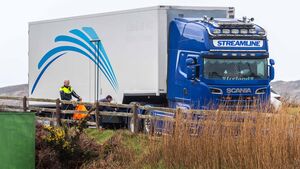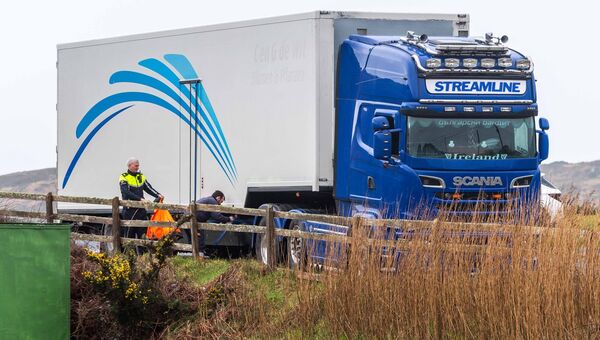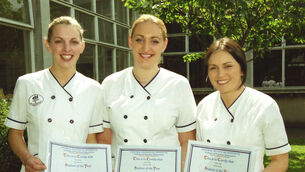NO HEADLINE

Gardaí were involved in a significant drugs operation on March 14, which started in Leap with occupants of a motorhome arrested, then moved on to Tragumna with this lorry being searched and detained. Picture: Andy Gibson.
On one hand, removing a problem from the public gaze means citizens can go about their lives — in this case a joyous celebration of St Patrick’s Day — without confronting disquieting, disturbing consequences of short-term public policy. Alternatively, it can be seen as failing to acknowledge a problem that is slipping away from Government and is on course to become worse — which makes hypocrites of us all in the land that likes to boast of its thousand welcomes.
The removal of tents occupied by international protection applicants some 20km from their pitch in Mount St, Dublin, to Crooksling has been justified as an improvement to health and safety.
Taoiseach Leo Varadkar, speaking in Washington DC, said that “being provided with accommodation, where there’s running water, where there are showers, where there are toilets, is better than living on the streets”. There have also recently been outbreaks of scabies, a skin infestation, among some people living in the settlement.
While the arguments for relocation are sound, there will be curiosity as to why it has taken place now, and to a site previously subject to anti-migrant protests.
The suspicion, and in some cases, the accusation, is that our Government did not like the rain-on-our-parade potential of an unsightly refugee encampment in the centre of the capital, on a weekend when hundreds of thousands of visitors were descending on the Fair City.
While this transfer may have been carried out, in terms of timing, for cosmetic reasons, we must not become inured to the concept that forced relocations from one temporary site to another are a normal feature of life in Ireland.
The rise in the numbers of applicants for international protection who are subsisting outside of State-provided accommodation has been inexorable.
Integration Minister Roderic O’Gorman is due to return from Japan to present to Cabinet a revised plan for accommodating asylum seekers. The costs of failure to find a sustainable consensus are huge for a Government whose supporters are becoming more vexatious by the day.
There’s another long-standing saying that is particularly beloved of management gurus and business school lecturers. “What gets measured gets done, ” they like to say, while trotting out their latest “key performance indicators (KPIs)” to demonstrate how we are all doing.
As we have witnessed, the KPIs for new housing and emergency accommodation for asylum seekers and refugees are looking less than stellar at the moment.
We must stand against hardwiring under achievement into our support systems, and maintaining the casual cruelty of moving people elsewhere and telling them to “find a place on the mountainside”. We need a plan that works, and we need to stick to it.
Various seizures of large-scale operations have been well recorded in the for more than three decades.
That the failed attempt to bring in two tonnes of cocaine along the Cork coast may be part of a global drug trafficking ring run by organised crime gangs in the Netherlands and Iran is one thing. That it is linked with the extreme Lebanese militant group Hezbollah introduces a different order of magnitude.
Hezbollah, or its military wing, has been designated a terrorist organisation by the EU, by most member states in the Arab League and the US. It is proscribed in Britain.

The depleted state of the Irish Naval Service has been a growing scandal over the past decade, with little political will demonstrated to do anything about it. When Taoiseach Leo Varadkar was recently challenged, he responded: “In relation to protecting our seas, we have our own navy, it’s not as strong as it needs to be, and we’ve entered into agreements ... which particularly relate to the cables that are around the island which are important to us, and also important to our neighbours.”
To say that the Irish navy is not as strong as it needs to be is a devastating piece of understatement which borders on the flippant. While there is always an attachment to the concept of neutrality when defence spending is tabled, we should also have a fondness for our own security.
We are in a war with criminal gangs which behave like rogue states. Our forces need appropriate levels of staffing and equipment to take them on.
There is also the grit in the oyster that constitutes our memories of falling short in last year’s World Cup, by a single score against the All Blacks, in the quarter-final in France.
It’s always said that slams are difficult in seasons where Ireland have to play away against France and England. But Ireland pulled out a devastating victory in Marseille only to lose by one point at Twickenham to an English side.
Our rugby columnist, Ronan O’Gara, sounded a useful warning when he described Ireland “in trading floor parlance” as “an overvalued stock”. We will see how true that is in July’s two-test series against the Springboks. For now we should enjoy being champions. Such things are rare enough.
We should hope, also, that Irish captain Peter O’Mahony gives his international rugby career at least another year. As many might tell him — you’re a long time retired.





